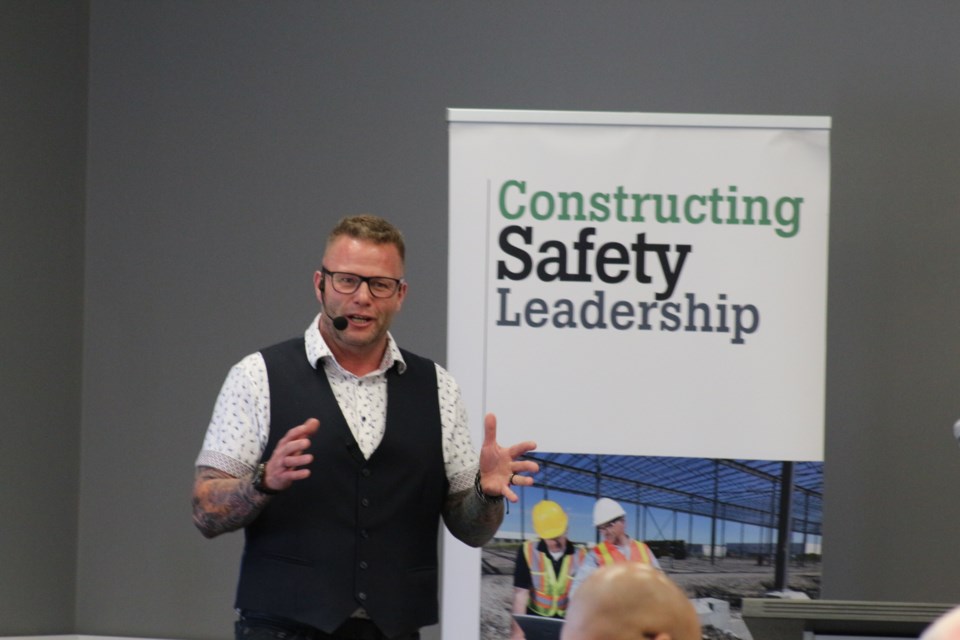YORKTON–The Sask Construction Safety Association held it's annual general meeting at Yorkton's Gallagher Centre on March 27.
60 to 70 contract companies, tradespeople and union members from residential, industrial and commercial trades gathered at the Gallagher Centre's convention centre for a lunch and spoken word presentation from Brad Siroski.
Siroski—who grew up in small-town Saskatchewan and worked numerous construction jobs throughout his life—spoke in detail about his struggles with mental health and addiction.
"A recurring theme in Brad’s speaking is perseverance. He overcame many hurdles in his addictions and was once again tested when he received a cancer diagnosis in 2015. Brad faced this head on and is currently living cancer free. This experience gives Brad a unique perspective on how people are treated when struggling with addictions in comparison to struggling with a disease," detailed an excerpt from Siroski's bio on BradSiroski.com.
Now, many years after addressing his addictions and mental health issues, Siroski works as a counsellor for the Sask. Health Authority and runs a private practice out of his home in Saskatoon.
"I'm just trying to get around and spread the word on mental health and try and make sure that everybody hears my stories and some positive supports," said Siroski in an interview with Yorkton This Week after his presentation at the AGM, adding, "I'm all over Saskatchewan with the public speaking and I've been lucky enough so far—between holiday time and a really understanding boss—that I've been able to keep doing what I love as well as keep my job in the Health Authority."
"Today we've got our Annual General Meeting which we're hosting here, but we're also hosting a great session that's focused on mental health which has been a major priority in the construction industry," said Collin Pullar, President of the Saskatchewan Construction Safety Association.
"Particularly talking to men—men as a whole have a much higher percentage in terms of suicide and substance abuses," said Pullar, adding, "it's particularly true in construction—a lot of factors go into that—sometimes it's the nature of the work; people start off having pain from a subsequent injury or being away from home, loss of connection—some of the uncertainties that can come with working in the construction industries ups and downs."
"Probably about 50 per cent of the clients I deal with work in some kind of labour profession," said Siroski, "whether it's construction or welding or plumbing or labor intensive jobs like that."
Siroski said he figures one in five people working in construction are going through some form of mental trauma or drug addiction.
"A lot of bosses don't know that because people are not willing to be vulnerable and not share and often they don't feel like they're going to be heard—they feel like they're going to be met with those closed doors that I spoke about," said Siroski, "I would say for sure if we looked at the work force, it's probably about one in five people, one of those people would be struggling with some sort of mental health or addictions issue."
"Those are sometimes factors that are an addition to other challenges that people have—so if they don't have a really great outlet to take care of themselves things can really tend to escalate—so that's one of the things that the industry is really concerned with," said Pullar.
"It's one thing to have that at an extreme level but it's just the same way if someone's going through a difficult time in their life they may not be paying attention to the task at hand," said Pullar, "if [workers are] doing a dangerous task—handling a tool, moving a piece of equipment—and aren't paying attention for a couple of moments, something pretty significant can happen to themselves or somebody around them."
"Our industry is fairly broad—everything from the residential to the commercial to the industrial construction sectors," said Pullar, adding, "[Construction] employs well over 40,000 people in the province."
"It's hard to be vulnerable—especially as a male—it's hard to go to your boss—who may also be a male—it's hard to go and say, 'I'm struggling', or to shed a tear or to admit that you have mental health issues," said Siroski, adding, "people need to be vulnerable, bosses need to have big hearts and big ears and listen—that's the whole thing for the work association for mental health in general."




